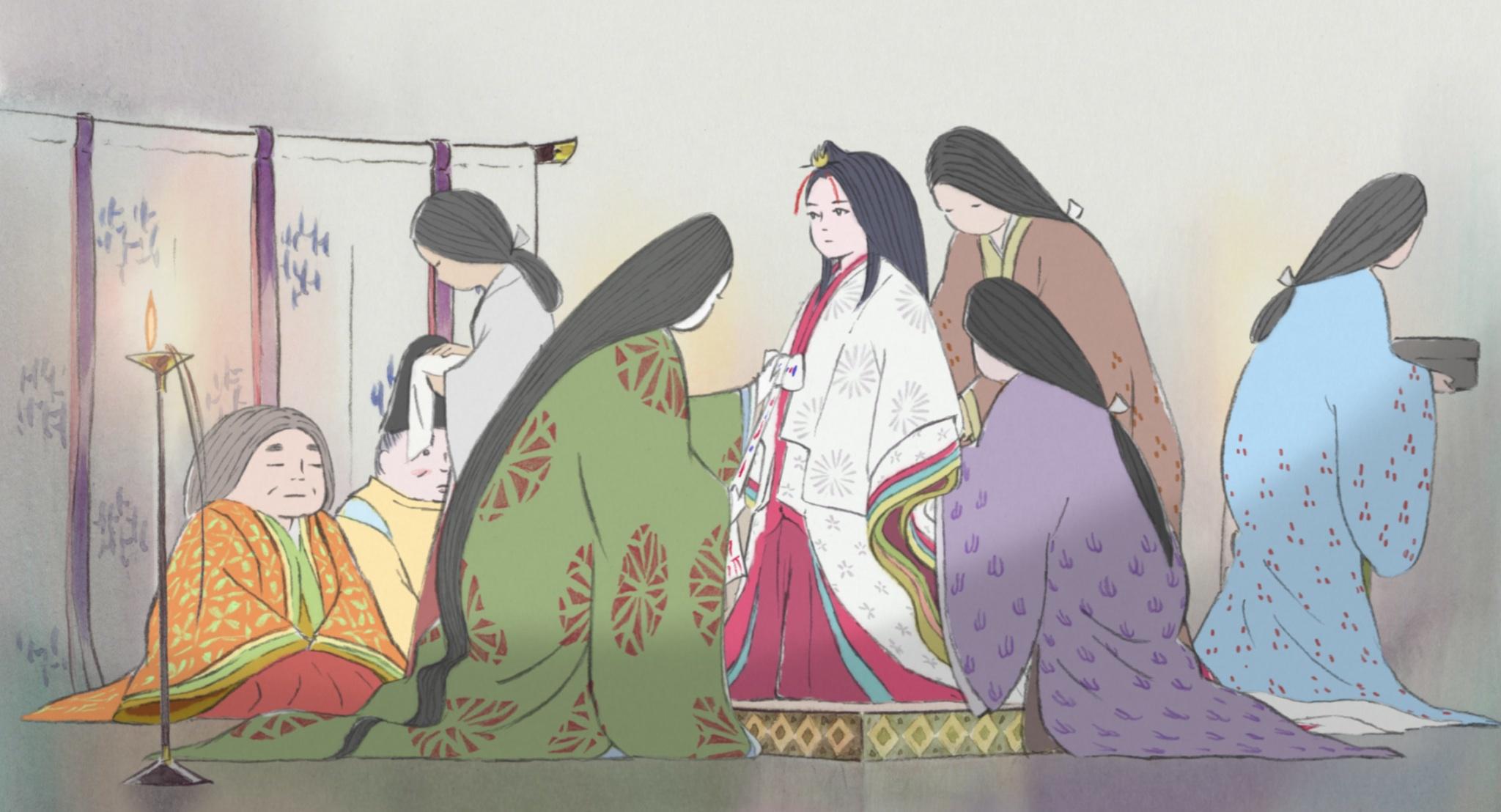
Nordling here.
Studio Ghibli's THE TALE OF PRINCESS KAGUYA is directed by Isao Takahata. I knew the name, but when my friend Samantha reminded me that he was also the director of GRAVE OF THE FIREFLIES, I knew I was in trouble. Sure enough, fifteen minutes in, the tears came, and they didn't really stop until about fifteen minutes after I left the movie. KAGUYA is yet another masterpiece by perhaps the greatest animated studio on the planet, but it's also one that rewards patience and attention. It's a beautifully animated film, full of the watercolor style of MY NEIGHBORS THE YAMADAS (also directed by Takahata) but it's such a gorgeous color palette that the animation looks nothing but simple. The look, the score (by longtime Ghibli composer Joe Hisaishi), the emotion, and the rich characters pull you in in the way that only a Studio Ghibli movie can.
KAGUYA is based on a well-known (and well-adapted) Japanese fairy tale, but Takahata builds upon the deceptively simple story to weave a tapestry that is intimate yet as large as life. When a bamboo cutter comes across a glowing bamboo stalk in the woods, a blooming plant opens up to reveal a forest spirit. When he brings it home to his wife, the wife takes it in her hands and it transforms to a human baby. The couple realize that the child is a special princess, sent straight from the gods, and as the child quickly grows, the bamboo cutter vows to give her the life of a princess, the life he feels she deserves. He finds more treasures in the bamboo - gold, cloth for sewing, and soon the bamboo cutter has created a name for himself and his family in the capital city. The princess misses her simpler life, and as she grows older, the freedom to do as she wishes clashes with her responsibilities as a princess and her gender role in Japan.
KAGUYA feels, oddly enough, more timely than ever. It's a very feminist movie, but it arrives at its message through empathy and its relationships, and not through blunt force. Our children are gifts, the film suggests, but we cna misuse our gifts, or refuse to share them with the world. The princess is not a prize to be won, hidden away as tradition would suggest, and Kaguya chafes at her assigned role, yearning for the freedom she experienced as a child, when her family was poor. Her father, now rich and with influence (although the true aristocracy recognizes him as a Johnny-come-lately) truly believes he is doing the best he can for his daughter, even as the vise around her slowly tightens and takes away her dignity and her special nature. When her father realizes what he has done, it is one of the most emotionally powerful moments in the film, and it left me in tears. As a parent, I know what we think is best for our children may not coincide with what they wish to be, and what they wish to become. Kaguya's father realizes too late what he has done, and it affected me deeply.
THE TAKE OF PRINCESS KAGUYA is a long film, and it takes its time. It luxuriates in its beautiful images, and spends time with its characters. The Studio Ghibli films have always had the uncanny ability to find goodness and relative commonalities in its characters - there are very few out-and-out villains in a Studio Ghibli movie, and THE TALE OF PRINCESS KAGUYA is no exception. It's also a very funny movie, especially when Kaguya's suitors attempt to marry her, and her rebuffs, and their attempts to make it right, are very funny moments. There are adorable moments in the film, especially when Princess Kaguya is an infant, and I've always admired how Studio Ghibli's animators simply animate people moving, or walking, or reacting to their world. They tentatively explore their surroundings, and the artistry is present in every frame. It feels both real and magical at the same time, and the sumptuous look og THE TALE OF PRINCESS KAGUYA gives the audience something to marvel at during each moment.
There is deep sadness and regret in THE TALE OF PRINCESS KAGUYA, a regret that comes from loss and a failure to recognize the beauty around you until after it is gone. My daughter is a fan of many of the Studio Ghibli films, and while I'll happily show her this one, in a way, it will be an apology of sorts, because parents, no matter their intentions, mess up. We all screw up our kids in some way. We don't mean to. What is best and what we think is best are, often enough, not the same. In our fervor to secure something tangible and safe for our children, we can forget to pay attention to their journey as opposed to our own. THE TALE OF PRINCESS KAGUYA is a wonderful tale for parents and children both, beautiful and sad, and any filmgoer who is a fan of Studio Ghibli should not miss it. This is one of their very best films.
Nordling, out.
